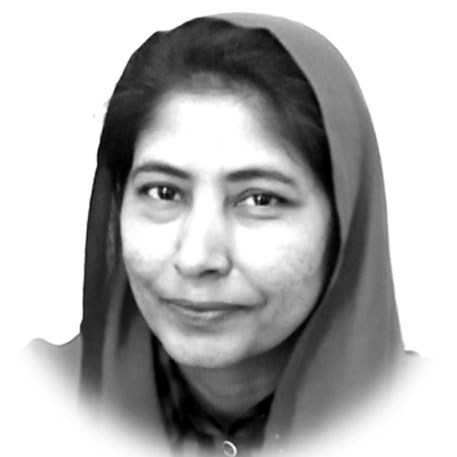Dr Nasreen Akhtar
PAKISTAN is considered to be safe and
peaceful country. First time in Pakistan’s
political history the civil-military leadership have consensus on national and foreign policies. This working and cooperative relationship may irk Pakistan’s archrivals. Ten soldiers martyred in the recent two terrorists’ attacks, in Balochistan and in the erstwhile FATA’s district, North Waziristan. These attacks have increased the new militant threat in the country vis-à-vis security forces. Pakistani forces have played their enormous role in eliminating terrorists’ network from the former Tribal Agencies. However, Balochistan is a major area where foreign forces – Afghanistan and India –are actively engaged to destabilize this province. Notorious Baloch Liberation Army (BLA) has recently been declared a terror group by the United States. Though, in the new attacks no terror group claimed responsibility but the role of Baloch militant groups cannot be ruled out. These groups are working with the help of India and Afghanistan. Are they taking any assistance from Iran must be investigated.
Afghanistan and India are two conflictual neighbouring states, they have been exploiting Pakistan’s internal conflicts. In fact, Afghanistan’s soil is being used by India which has a great strategic interest – dominate the region and deflect the Kashmir cause. Pakistan is the only country in the region which has potential to undermine India’s influence. Pakistan is playing a pivotal role in facilitating negotiations between the US and Taliban, which may hurt India’s strategic interests in Afghanistan. Most recently, Pakistani Prime Minister Imran Khan and Chief of Army Staff, General Qamar Javed Bajwa, completed their visit to the US. The two leaders successfully restored confidence and reset the broken relations. Trump’s Administration also accepts and acknowledges Pakistan’s role for peace and stability in the region. Certainly, restored and normal relationship between the US and Pakistan would limit India’s role in Afghanistan. The recent attacks happened after the successful visit which was staged by the enemy of peace. These forces would not stop to sabotage peace efforts by Pakistan. Since Balochistan is a troubling area internal and external terror groups would exploit security environment and both Afghanistan and India would support unrest to undermine Pakistan’s role as a “peace-maker state”. India has comprehensive anti-Pakistan policy. India has drawn a line around Balochistan and prepared a Balochistan specific-policy according to a White Paper to exploit the division within Pakistan and expose its weaknesses in Balochistan, former FATA and Azad Kashmir. Balochistan is, however, the suitable place where India is using BLA- providing weapons and training. India’s terrorism strike is visible in Balochistan. The Indian Government under Narendra Modi is more harsh toward Pakistan and has clear policy to exploit Pakistan’s internal problems particularly Balochistan. On Indian Independence Day 2016, Prime Minister Modi clearly mentioned ‘Balochistan’ in his speech that showed Indian intervention in Balochistan. The same year India’s spy, Kulbhushan Jadhav, was arrested who confessed his country’s involvement in Balochistan. This is widely seen as Afghan-India cooperation to protect their strategic interests and harm Pakistan’s in this region. The two – India and Afghanistan – consider Pakistan as their ‘common rival’. Another triggering factor which irritates India is Gwadar Port which has immensely strengthened China-Pakistan economic and security cooperation. This unique partnership is seen as a great threat to India’s regional strategic outlook.
Balochistan confronts multiple issues, political, security and ethnic. The province has seen cycles of rise of Baloch ethnicity and political accommodation. However, Baloch sub-nationalism has persisted over the decades. In its militant form, it has been aided by the hostile powers. Another part of Pakistan which is more critical is North Waziristan. The former Tribal Agency, North Waziristan, has been safe haven for the local and foreign terrorists. Pakistan’s security forces eliminated them and their outfit and survivors took shelter in bordering Afghanistan. Security forces were attacked by the banned Tehreek-e-Taliban Pakistan (TTP) in North Waziristan, because they have claimed responsibility for the attack which was apparently launched from across the border in Afghanistan. The Hindustan Times revealed on 21 September 2017 that the TTP has been an active card for India in Pakistan and Afghanistan”. The RAW-TTP connection was revealed by the former commander, Ehsanullah Ehsan.
After many years, military operations in the former Tribal Agencies have greatly managed to bring peace through development. Credit goes to the civil-military leadership for mainstreaming these agencies. The recent election in the tribal agencies has changed the political landscape of Pakistan’s political history. Both civil and military leadership contributed their efforts to bring peace in the erstwhile FATA. Though some internal factions strived to divide the Pashtoon community but they failed. These factors tried to exploit the peoples’ grievances and instigated the local community against security forces – two elected parliamentarians attacked soldiers in North Waziristan, their record shows they had links with anti-state actors, as the DG, ISPR, had disclosed in his press conference. Still foreign-funded terrorists are active and have capability to increase violence in the newly merged districts. India and Afghan hostile forces would certainly use some alienated local folk to challenge the security forces. Pakistan must take up these issues with peace makers’ stakeholders – Afghan government, the US. Pakistan should be protected from eastern and western borders. Afghan President, Ashraf Ghani, has to ensure Pakistan that his country is not being used by India or anti-Pakistan elements -TTP and banned BLA. Since Gwadar Port provides international connectivity, unrest in Balochistan would be alarming. Pakistan’s enemies do not want to see a stable, peaceful and progressive Pakistan. How terrorist groups are organizing and threatening security in Balochistan? This question needs to be investigated. And those operating from Afghanistan must be eliminated if the Afghan Government has no authority in its safe haven for the terrorists. This is the question to be probed.
—The writer is Assistant Professor, IIUI, Islamabad.










